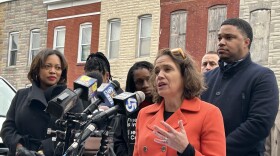About a dozen people gathered in the basement of the Penn North, branch of the Enoch Pratt Free Library, to cheer for the expansion of Baltimore City’s Peer Navigator program on Wednesday afternoon.
“We lose almost three times as many of our neighbors to overdose deaths as we do to homicide,” said Zeke Cohen, a Baltimore City council member and co-founder of Healing City, a trauma-informed collaboration of the city, universities and community groups. “This program allows us to keep more Baltimoreans alive.”
Peer Navigators are individuals hired to work with library visitors. Navigators themselves may have struggled with substance abuse or mental health and now serve as role models for recovery in a safe, supportive, and confidential environment.
Care First, the Maryland Blue Cross Blue Shield association, donated $453,717 over a three year period.
The grant enables program expansion to six more locations across Baltimore City’s library system.
Peer Navigators are now in place for visitors to the following libraries:
- Brooklyn
- Cherry Hill
- Edmondson Ave
- Walbrook
- Central Library
- Southeast Anchor
“We recognize there is no one-size-fits-all approach to behavioral health treatment and support,” said Lester Davis, vice president and chief of staff for CareFirst.
“This program brings together peers with lived experience and those in need of treatment in trusted community spaces,” Davis said in a statement.
Emily Keller, special secretary of opioid response, a newly created position in Gov. Wes Moore’s administration attended the event.
Keller, the former mayor of Hagerstown, said she was inspired to run for office after seeing her best friend treated like a criminal, instead of someone who needed help.
“The system failed her,” Keller said.
In her new post, she promised to be loud for those battling addiction who are often silenced.
“I’m going back to my office to email the library in Hagerstown ‘you need to make a connection here,’” she said.
And while advocates say that’s a good start, they challenged the state official to do more.
“You’re really in an optimal position to expand things,” said Philip Leaf, a Johns Hopkins University professor emeritus who has researched mental health. “Medicare and Medicaid can come probably 18 miles to see what's going on in Baltimore. As Secretary, you're able to potentially bring federal partners.”
Though Keller shied away, other substance abuse and mental health recovery specialists championed the idea.
“We know that opiates and libraries are everywhere,” said Tiffinee Scott, program founder of the Maryland Peer Advisory Council. “We can’t rely on one grant to do restorative and transformational work.”
Editor's Note: This story has been updated to accurately reflect the grant amount from CareFirst.













